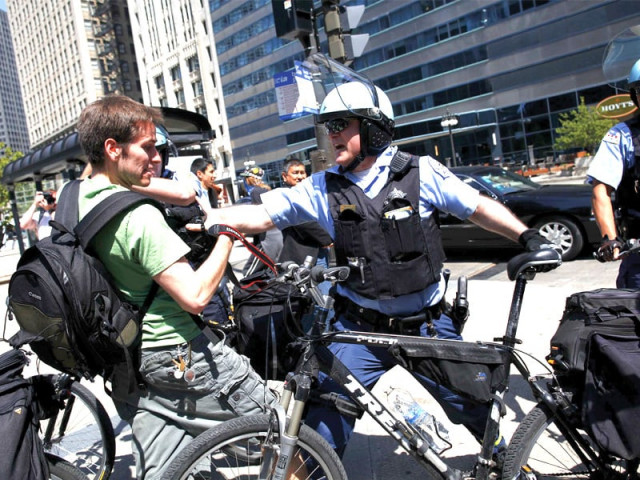Afghan endgame: World leaders gather in Chicago for summit
NATO meeting to also mull the alliance’s future amid financial crisis.

President Asif Ali Zardari, along with over 40 counterparts from across the world, descended upon Chicago on Saturday to attend Nato’s 2012 summit that will debate the Afghan endgame and the future of the alliance.
And while the alliance’s main concern is Afghanistan, Pakistan’s ability to make any meaningful contribution, let alone influence, the decision-making process appears to be uncertain.
Nato is primarily bogged down by doubts about its financial future, with most of its European members caught in major financial crises, and the increasingly unpopular mission in Afghanistan.
With France seemingly changing course sharply from right-of-centre to left-of-centre, the summit’s ability to come up with a unified position on all three major concerns of Nato – Afghanistan, Nato finances and European missile defense – has become less certain.
France’s U-turn
At a bilateral meeting Friday morning between President Obama and French President Hollande, the former is said to have had little success in trying to convince his French counterpart to delay French troops’ departure from Afghanistan by another year or to make reasonable contribution to the proposed kitty of $4 billion – considered the barest minimum to stabilise and sustain long-term peace in Afghanistan.
But Hollande has shaken up the carefully-crafted transition plan, vowing to bring his 3,500 combat troops home this year, over a year earlier than planned.
“The withdrawal is not negotiable. The withdrawal of combat forces is France’s decision and this decision will be implemented,” Hollande told reporters after White House talks with Obama on Friday.
Pakistan at the summit
President Zardari is meeting Nato’s Secretary General Anders Fogh Rasmussen later this evening and the most likely topic of discussion would be reopening of Nato supply routes. Negotiations are purportedly stalled on the issue of a mutually-agreed rate for transportation of Nato goods, with Pakistan asking at least half of what the US is paying for the Northern Distribution Network (NDN) route which is said to be $5000 for each truck. The US, however, is said to be amenable to pay only a bit more than what it is doing now for getting its goods across Pakistan – about $360 million a year.
Rasmussen, meanwhile, urged Islamabad to back efforts to stabilise Afghanistan.
“We can’t solve the problems in Afghanistan without the positive engagement of Pakistan,” he said at a policy forum in Chicago.
“We have to solve these problems,” he said, referring to the alleged safe havens used by insurgents in Pakistan to launch attacks on Nato troops across the border.
When he meets with Zardari later, Rasmussen said he would “convey a couple of clear messages,” but he did not elaborate.
There will be no bilateral talks between Pakistan and the US though. With both apology and drones off the table, there seems to be no other topic to be discussed between the two, except the opening of routes and its cost which are still being negotiated at a very low level. President Zardari is likely to have bilateral meetings with his Turkish and Afghan counterparts.
Isolation averted
Ambassador Sherry Rehman looked understandably overworked and was not very forthcoming about what objectives Pakistan was likely to achieve at the summit. She was glad, however, that Pakistan was invited after all, without linking the invitation to the opening of the supply routes, and that Pakistan has not missed an opportunity to be able to reiterate its commitment to contribute to meaningfully to the Afghan endgame at the summit.
“We have avoided being consigned to isolation by the world community,” was her relieved remark.
Shamila N Chaudhary, the former Pakistan Director at the White House National Security Council, was rather stern.
The fact that the US has gone this long already with routes closed is unprecedented, proving how much more reliant it had become on the NDN, she said.
“I believe this is the result of a deliberate effort of the administration to be less dependent on Pakistan, given the frequent lapses in cooperation over the past year. Because of this, the US can probably absorb more of a delay although it is not ideal, given plans for drawdown,” she added.
But she believed there was hope.
“At a time when many view Pakistan as part of the problem in Afghanistan, and despite ongoing bilateral tensions, the Obama Administration’s efforts to include Pakistan in the Nato summit exemplifies its view that Pakistan must be part of the solution to the Afghanistan endgame and cannot be ignored.”
“Pakistan’s participation is positive but if it does not open routes soon, it will have lost an opportunity to show support for international efforts to stabilise Afghanistan,” she added. (With additional input from AFP)
Published in The Express Tribune, May 20th, 2012.



















COMMENTS
Comments are moderated and generally will be posted if they are on-topic and not abusive.
For more information, please see our Comments FAQ